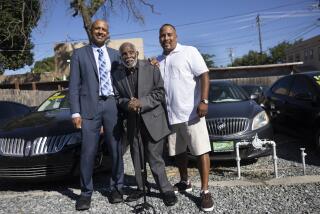Longer Prison Terms for Some Felons OKd : Jurisprudence: State justices abandon a Bird court decision that limited additional prison time for criminals who inflict added injury on their victims.
- Share via
SAN FRANCISCO — The state Supreme Court, overruling a decision from the Rose Bird court, opened the way Thursday for longer prison terms for rapists and other felons who inflict additional injury on their victims.
The justices abandoned a Bird court requirement that such harm must be “severe or protracted” to justify an extra three-year penalty for great bodily injury. Any “significant or substantial” harm may qualify for harsher punishment, the court said Thursday.
The 1978 decision, issued in the case of People vs. Caudillo, caused a firestorm of criticism and led to accusations during that fall’s election campaign that former Chief Justice Rose Elizabeth Bird and other liberals on the court were soft on crime.
On Thursday the high court, now led by conservatives, unanimously reinstated an additional three-year term on a convicted rapist and kidnaper who brutally beat his victim, leaving her with cuts, bruises and soreness that made her limp for a week.
A state Court of Appeal, citing the 1978 Caudillo decision, had overturned a jury’s finding of great bodily injury on grounds that there was no evidence the victim suffered “disfigurement or significant impairment.”
The high court, in an opinion by Justice Armand Arabian, called rape “an offense against humanity,” and added: “If we cannot fully expiate this evil, we can at least, within the bounds of contemporary morality, impose a just punishment to fit the crime.”
State Deputy Atty. Gen. M. Howard Wayne said the ruling would help ensure longer terms for any significant or substantial injury beyond the crime itself--such as a pistol-whipping during a robbery.
“We’ve gotten rid of the language (in the Caudillo decision),” Wayne said. “Now the public will be greater protected against acts of gratuitous violence.”
The lawyer for the defendant in the case could not be reached.
The case began in September, 1989, when a 31-year old Garden Grove woman, identified by the court as Maria C., was accosted by Joaquin Escobar as she awaited a bus. According to police, Escobar forced the woman to drive with him to a spot near a freeway, where he slapped her, yanked her hair, threw her down, dragged her and poked her in the eye with a finger before raping her.
Escobar was convicted and sentenced to 11 years for rape and kidnaping and another three years for inflicting great bodily injury. A Court of Appeal in Santa Ana set aside the sentence enhancement in May, 1991, by a 2-1 vote.
On Thursday, the justices concluded that the Bird court’s 1978 decision had misinterpreted the Legislature’s intent.
The Bird court refused to allow an additional penalty because a rape victim’s injuries were “transitory and short-lived” and there was no evidence of lasting or visible disfigurement or “protracted impairment” of a bodily function.
The high court Thursday let stand a finding in the Caudillo case that rape, in itself, did not constitute great bodily injury. But the other requirements established in the decision must be abandoned, the justices said.
The injuries inflicted on Maria C. by Escobar, while not permanent or protracted, were serious enough to meet the Legislature’s requirement of being significant or substantial, the court said. The nature of the injuries would have supported the harsher penalty even under the now-abandoned standards of the Caudillo decision, the justices added.
More to Read
Get the L.A. Times Politics newsletter
Deeply reported insights into legislation, politics and policy from Sacramento, Washington and beyond. In your inbox twice per week.
You may occasionally receive promotional content from the Los Angeles Times.









